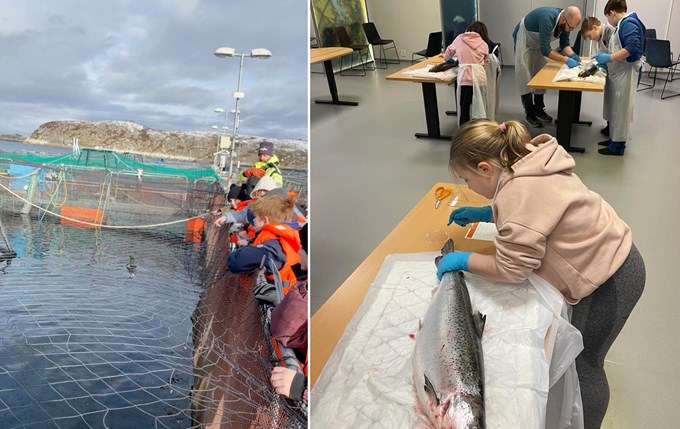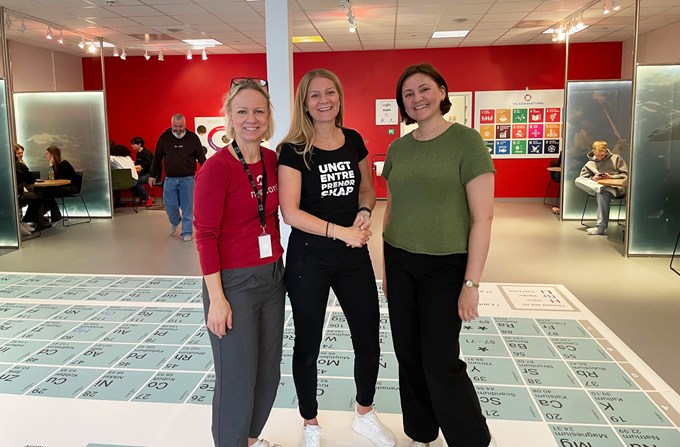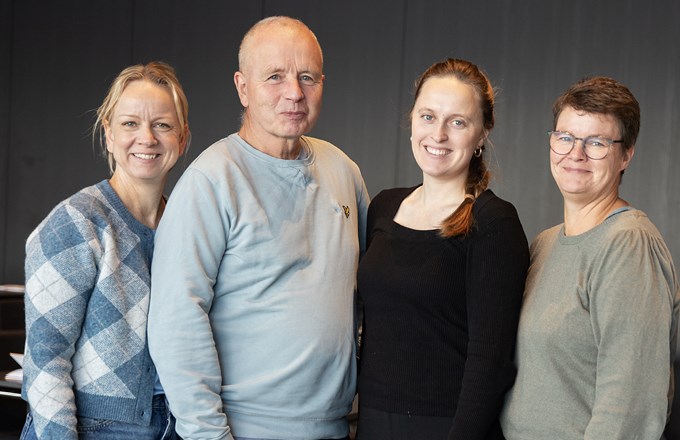A great math teacher once showed Line Rønning Føsker that numbers could be full of patterns, logic, and joy. That experience sparked a fascination with mathematics and a drive to share it with others. Now, as a Newton teacher in Sandnessjøen, she helps students discover the exciting STEM opportunities right in their own community — from local robotics and aquaculture companies to fish researchers on the Helgeland coast.
Name: Line Rønning Føsker
My Newton Room: Newton Sandnessjøen,
Location: Kulturbadet in Sandnessjøen, Nordland, Norway
Has been a part of Newton since 2018
Professional Background: Lecturer from NTNU in mathematics and informatics, with a master's degree in mathematics education. I taught and researched math in kindergartens at the teacher training program at the University of South-Eastern Norway for 13 years before moving back to Helgeland. I now teach mathematics and science at Sandnessjøen Upper Secondary School in addition to being a Newton teacher.
Life Outside of Work:
Married with three children aged 13, 19, and 22. I sing in a mixed choir in my free time and enjoy hiking in the mountains and countryside, as well as taking saunas all year round.
What sparked your interest in STEM (Science, Technology, Engineering, Math) in the first place?
“I had an exceptionally good math teacher in high school who built strong relationships with the students through humour and simply by being a genuinely kind and caring person. It had a big impact on my connection to the subject and my motivation to pursue it further. I have always enjoyed the search for patterns and structure that lies at the heart of mathematics, and helping children discover the same has always brought me joy.”
What do you love most about working in a Newton Room?
"Creating continuity throughout the educational path, from kindergarten to upper secondary school."
What’s your favourite topic or module to teach, and why?
“I love showing the students the opportunities available in their local area. When they see cool videos from the local robotics company or they work with fish researchers in a local aquaculture company, they're impressed and realise that working with science is possible here, both as youth and adults. That's when we hear a lot of “ooo”, “wow”, and “oh!”.
What do you hope students and teachers take away from their visit to your Newton Room?
“The best feedback is when students ask to come back, “can we please come back tomorrow or for summer school or something?” —when they remember the Newton Room as a special place where they can contribute and have a great day! I hope teachers feel that the room is made for them, too and eventually feel at home here. That way, they might suggest changes, express wishes, and share great ideas.
 During the module Fish = Food, the students visit a fish farm and gut the fish themselves.
During the module Fish = Food, the students visit a fish farm and gut the fish themselves.
Can you share a fun or inspiring story that happened in your Newton Room?
“One of the first times we taught the module Fish = Food, a girl working on a salmon dissection suddenly exclaimed to her learning partner while pointing at the exposed fish flesh: “Hey, look! Look! It looks just like salmon!”
It was clear that she had only ever seen salmon as neatly filleted meat — the kind you find in the store or in the fridge.
The moment made a strong impression on us as teachers. It reminded us that even children living along the coast may not have many experiences with animals in general, and fish in particular. The teaching we provide can help ensure that all children gain these fundamental experiences and the essential knowledge they need.”

Outside of regular Newton activities, Newton Sandnessjøen hosts events such as an annual open day, a “Heimkommardag” for students and apprentices, and collaborates with local businesses and networks on meetings, team building, and various regional initiatives.
How can we best inspire children and young people to pursue STEM education and careers?
“By having the best teachers in the early grades. Early efforts are the most important. We must stop the teacher exodus from lower primary school by giving them better working conditions and smaller groups. They should be offered higher pay and free continuing education (with a substitute teacher) in science didactics every year if they want. Science strategies won’t help unless teaching becomes more attractive—especially for the youngest students.”
If you could meet one famous scientist, past or present, who would it be and why?
“I would have loved to meet Gottfried Wilhelm Leibniz (1646–1716). He was a German mathematician and philosopher, known for many contributions, but he actually worked with the binary number system, which forms the foundation of modern computing. He saw binary numbers as a way to represent all information and understood their potential for logical operations, and he worked on a calculator. His ideas were far ahead of his time, very inspiring.”
What are three things on your bucket list?
“Take the kids on a trip to Asia, see the musical Hamilton in London, and take dance classes.”
 Teachers in Newton Sandnessjøen. From left: Line Rønning Føsker, Per Arne Haugen, Elisabeth Skagøy, and Karin Strøm.
Teachers in Newton Sandnessjøen. From left: Line Rønning Føsker, Per Arne Haugen, Elisabeth Skagøy, and Karin Strøm.
Newton Sandnessjøen
Newton Sandnessjøen is in its thirteenth year, but is now established in a beautiful, large room at the top of Kulturbadet in Sandnessjøen. Kulturbadet is the cultural centre for Alstahaug and the entire region.
They have fantastic opportunities to collaborate with the library, the cultural school, the school cinema, the swimming pool and also the hotel with a restaurant—all housed in the same building.
The Newton Room is situated on the waterfront, providing easy access to the surrounding islands and municipalities. When school classes travel long distances from the islands, we can tailor varied days for them here, with Newton and science at the core.
Newtons Sandnessjøen offers nine Newton Modules:
-
We explore energy
- Plastic - from macro to micro.
- Chemical action.
- Fish = food!
- Fractions.
- Exploration with the scientific method
- Robots and circumference
- Life of the Bumble Bee
- Mission Possible - King's Treasure